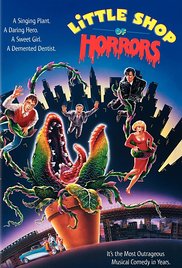A failed film that I still enjoy and own on blu-ray home video is the musical version of Little Shop of Horrors. (I also own a copy of the original which I had seen some years  earlier at a local art house theater.) Th film is fun, the actors are talented, and the music endearing, but the film is seriously flawed and the theatrical release version is substantially different from the original cut. The blu-ray hosts both version the original release a director’s cut restoring the ending. In the following discussion there will of course be spoilers for the film and one for the television series Breaking Bad. (Trust me it will make sense to link the two properties.)
earlier at a local art house theater.) Th film is fun, the actors are talented, and the music endearing, but the film is seriously flawed and the theatrical release version is substantially different from the original cut. The blu-ray hosts both version the original release a director’s cut restoring the ending. In the following discussion there will of course be spoilers for the film and one for the television series Breaking Bad. (Trust me it will make sense to link the two properties.)
Still with me? Good.
The original ending of the film, just as with the stage play, our hero, Seymour Krelborn feeds his dead girlfriend to the carnivorous, intelligent, and evil plant Audrey II (Named after the girlfriend) and then later himself in a bizarre suicide. The film continues for more than seven minutes of the plant and its offspring conquering the world until it burst from the screen to threaten the audience directly.
The ending played horribly with test audience and reshoots quickly changed the ending. Now Audrey I, the girlfriend, survived her wounds, Seymour battles Audrey II and saves the world with only a hint that the danger has not been fully bested.
Even with the happy ending the film never found a wide audience and continues on as a minor cult favorite. In interviews and audio commentaries Director Frank Oz as stated that he had not understood the power of ‘close-up’ and how they transform an audience’s relationship to the characters and thinks this is why the test audiences rejected a movie where the hero dies at the end. The close-up had erased the distance and now the audience possessed too much empathy for such an ending to work.
I think his analysis is wholly wrong.
In the story Seymour, poverty stricken and almost certainly doomed to a life on skid row discovers that through the alien plant he can have fame, wealth, and love of the girl he adores, Audrey. The wrinkle is that the plant feeds on blood, human blood and quickly its appetite grows beyond what he can safely provide from pricked fingers. Audrey II manipulated Seymour’s infatuation with Audrey I to convince Seymour to murder her boyfriend, a cruel and sadistic dentist, so that the corpse can be fed to the plant.
When Seymour goes armed with a pistol to kill the dentist a serous of comedic accidents lead to the situation where the dentist is suffocating on laughing gas and Seymour stands by and does nothing as he dies.
In articles published before the movie was released Oz confessed to shooting the story in such a way as the preserve Seymour’s innocence and not make him a blatant murderer. He failed.
In Breaking Bad the protagonist Walter White goes on a five season decent into evil until he transforms into a thoroughly rotten man. At one point, rather than loose an associate to a new girlfriend, Walter stands by and watched as the girlfriend, passed out from a heroin binge, chokes to death on her own vomit.
In both case the characters were presented with the ability to prevent a death and took a knowing and willful act to do nothing, both are murderers.
An altered song from the soundtrack stressed how the play understood this dynamic but that Frank Oz did not. There is a song, and it’s quite good, call The Meek Shall Inherit. The song plays out with a chorus as Seymour is presented with numerous contracts and deals to solidify his fame, fortune and change of luck. Seymour almost rejects the offers, knowing that means more blood, more bodies, more murder, but he fear of losing Audrey is too powerful and knowing all this he signs. The song ends with chorus sings that ‘the Meek will get what’s coming to them.’ In the film, both versions, the entire second half of the song with Seymour’s knowing decision has been edited out. The set-up for the ending has just been removed.
These two elements are the largest factors why that ending didn’t play, the story was altered so that it promised one thing and delivered another. Few stories can survive that. You have to set-up and payoff the right ending for the right story.
Two other elements, not as critical, also play into the film’s failure.
First, this was 1986 and dark film about doomed heroes were on the outs. The cinematic landscape demanded relentless upbeat movies and clear heroic victories, big mainstream movies no longer engaged in ending that were better suited to the 1970s.
Second, seven minutes of the monsters taking over the world? In a movie that ran a total of 103 minutes, not even two hours? It’s dull to watch that much film roll bye without a single character that is known the audience. Al the named characters are dead or gone, it’s spectacle for the point of doomed and dark ending that won’t play in that decade.
No, Mr. Oz, it was not the close-up of Rick Moranis or Ellen Green that doomed your movie, it was botched story telling.



